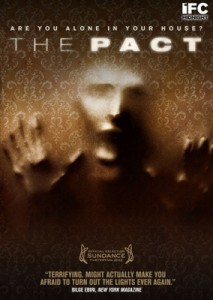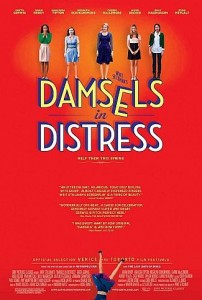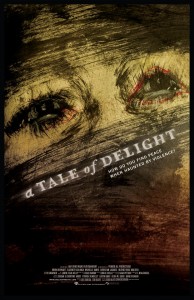The Pact

Plot: After her abusive mother passes away, Annie (Caity Lotz) reluctantly returns home to attend the funeral. When her sister, Nichole (Agnes Bruckner), and cousin, Liz (Kathleen Rose Perkins), disappear, she believes it to be a paranormal entity. Detective Bill Creek (Casper Van Dien) doesn’t believe this is the case, but even his findings are too mysterious.
Review: “The Pact” is a standard ghost tale up until the final act. It takes place in a small home with hallways that swivel around, giving our victim(s) ample room to run around and scream. This also allows Nicholas McCarthy to develop atmosphere and use it to his advantage. There are numerous shots of our protagonist lounging around as something swiftly moves in the background. He even uses Detective Creek’s camera to utilize this trick.
The finale alters this a bit from the norm. It’s still a ghost story, but there’s more than meets the eye. The twist is sagacious and well thought out! It’s not groundbreaking material, but it adds up and caught me by surprise. Just as I thought I knew how everything was going to turn out, I was hit with a left hook. Not a powerful KO, but a modest shot.
What softens the blow is the standard build. It’s not that it’s bad; it’s finely directed. It’s just that it hits too many familiar notes. Enough to whet the viewers appetite, but not enough to quench their thirst. Even when the final act begins to play out, it’s not wholly satisfying to make up for everything else. It may be more effective than it has any right to be solely because of how ingenious it is compared to the rest of the film.
“The Pact” is a fine thriller that will at least fill the quota of a ghost story aficionado. There are enough bumps and slick camera tricks here to elicit a few chills. The finale helps make it a bit more memorable, but it doesn’t completely make up for the average build. Check it out if you’re in the mood for a decent ghost story. Move along if you’ve seen your fair share.
Final Rating: B-
Cleanflix

Plot: Andrew James and Joshua Ligairi examine the legal battle between Hollywood and a small Utah-based movie editing company (CleanFlicks), who take R and PG-13 films and edit sex, violence and vulgarity out for families and those heavily religious (i.e. Mormons) and re-sell them.
Review: Putting my personal opinions on the Mormon culture aside, I can understand why they’d want “cleaner” films. Films depicting sex, violence and vulgarity go against their religious beliefs (though it seems mostly sex bothers them, as none of the horrific violence from “Fargo” was cut). They still want to be a part of the cool crowd and discuss these films, but not go against their beliefs. I could make an argument on how if the original film goes against their belief they simply shouldn’t watch it, but I’m not here to debate. I’m here to review the documentary chronicling their criminal editing and reproduction of films for profit.
If by chance those involved in pioneering Cleanflix read this and won’t to discredit my comment about them reproducing films for profit, I will politely say you’re not fooling me. You may have good intentions (in your mind) in editing these films, but the fact of the matter is you created a business that garnered you revenue off of these edited films. The fact that you originally purchased a copy of the film doesn’t give you the right to edit it as you see fit and resell it. It’s not that hard to understand that simply purchasing a copy of the film doesn’t mean it’s officially yours and can do with it whatever you please. You didn’t buy the copyright for the film. If you wanted to edit the film for yourself, that’s fine. Reselling said copy for profit is not.
They won’t have much to worry about this review, however. Danny Thompson seems to be their biggest detriment, more so than the Directors Guild of America (who helped in shutting them down). He operated a Clean Flicks store and, even after they went under, continued to sell edited films by attempting to bypass the fair use copyright. As it turns out, he’s not the clean cut Mormon man he portrays himself as and gets himself (and Clean Flicks, who had no association with him at that point, nor did he ever have a stake in their company, prompting one sole time I felt sorry for them) into water.
James and Ligairi do get a little lost when dissecting Danny Thompson’s involvement with movie editing. While transitioning from Clean Flicks’ downfall to his flourish made sense (considering it fit with the topic), dissecting his personal woes wasn’t exactly in line with the documentary. It worked to a degree (the final statement about how his lifestyle was a perfect mirror to Clean Flicks’), but felt as if it deserved it’s own film. Maybe it was involved to pad the film out to an hour and a half.
That’s the only real issue I had with “Cleanflix”, more and less that it did drag a bit (and become repetitive). For the most part, this is a fantastic documentary on the illegality of movie editing for resale! It uses the Mormon lifestyle as a crutch solely because that’s the reason it came to be. Whether you agree or disagree with their sentiments is irrelevant to the outcome of their court case. It is relevant to how the documentary plays out for you, though you’ll be involved either way.
Final Rating: B+
Damsels in Distress

Plot: A trio of girls (Greta Gerwig, Carrie MacLemore, Megalyn Echikunwoke) set out to change the male-dominated environment of the Seven Oaks college campus and rescue their fellow students from suicide. When they invite Lily (Analeigh Tipton) into their group, she begins to see that the well-intentioned women have issues of their own.
Review: For as smart as Whit Stillman is, he begins to lose control of his own film. Like the women he presents, he is filled with good intentions, but has questionable ways of portraying it. The first half of this film is a rather brilliant look at college life and, more specifically, the way the students think! Violet (Gerwig) is shown as a brilliant woman who’s major downfall is her own self righteousness. She criticizes others for being egotistical when she herself is just that.
Lily calls her out for this and Violet actually thanks her for doing so. She states what is the most pivotal aspect of my criticism; she needs a friend like Lily to balance her out. This is the most honest thing anybody says in the film and is why the first half works! Lily is the audience’s mouthpiece; the sensible character we relate to. She, like us, defends the trio’s noble actions, but also calls them out when they become too righteous and miss the point.
Then, Stillman seemingly forgets about Lily and focuses heavily on Violet. A good chunk of the film is devoted towards her breakup with Frank (Ryan Metcalf), a man she admits to dating because he’s not conventionally good-looking or smart. As the film rolls on, we learn he and the rest of his fraternity border on idiocy. One can’t even tell what color is which (and no, he isn’t color blind). Weak caricatures like this and Rick DeWolfe (Zach Woods), the one dimensional prick who runs the school paper (and is criminally underdeveloped) bring the film down, but aren’t the nail in the coffin.
It’s the erratic nature the story takes that diminishes this film’s impact. When Lily finally returns, she is dealt with two curiously bad relationships that are presented as good one second and bad the next. This I actually like, as it showcases the mercurial nature of college students. What I don’t like is that we lost our mouthpiece and a sense of direction. I didn’t even touch the film’s overt quirkiness, which becomes irritable by film’s end.
I almost hate to criticize “Damsels in Distress” as I do think it’s a smart film! Whit Stillman is an intelligent director and his examination of college life is grand. His direction, however, didn’t sit well with me. The characters’ inconsistencies make sense; his direction doesn’t. Why make such flamboyant caricatures to feed to the protagonists, only to all but erase them? I can see where this would work and understand why it does for others, but it didn’t for me.
Final Rating: C+
Behold the Lamb

Plot: Eddie (Nigel O’Neill) and Liz (Aoife Duffin) cross paths after her boyfriend, his son, ditches them in the cold. Eddie needs a lift to pick up and transport a lamb laced with drugs and pays Liz to be his chauffer.
Review: It was a wise decision of John McIlduff to give top billing to the lamb. He/she is the most interesting aspect of the film. To be more specific, he/she is the only interesting aspect of the film! There are only two moments in this film that I smirked and showed interest. Those both involved the lamb. The first was Eddie trying to shoot the lamb, only to fail miserably and chase it around the woods. The other was when he was feeding the lamb milk in the car.
There you have it; the only two noteworthy scenes in “Behold the Lamb”. The rest of the film is a dull road movie with two characters I couldn’t have cared less about. Eddie is an average joe with no discernable qualities outside of his epilepsy. Liz is a Juliette Lewis clone who does get the benefit of having a son to give her depth, but that’s never fully developed. McIlduff seemingly threw it in to give her a quality, just like he gave Eddie epilepsy for the same reason.
What more can I say about “Behold the Lamb”? I simply didn’t care! I didn’t care about Eddie and Liz! I didn’t care about their road trip! I didn’t care about their problems! I didn’t care about the toy warship that kept breaking down! The only thing I cared about was the lamb! Oh, and I guess that scene at the rest stop where they attempt to hijack a car was amusing. Whatever.
Final Rating: C-
A Tale of Delight

Plot: Michael (Bryan Bernart) is in a Clinic coping with depression brought on by a traumatic experience. The doctors believe it’s a wise idea for him to spend Christmas with his sister, Camille (Elizabeth Colunga), and their cousins, Greg (Christian Lagadec) & Jessica (Michelle Damis). This turns out to be a mistake, as it only furthers his anguish.
Review: “A Tale of Delight” isn’t the easiest film to review. Not that it’s bad, mind you. Quite the opposite. It’s a well crafted and strongly acted drama about depression and how people cope with it! Not just the ones going through it, but the people surrounding the depressed person and how they handle others’ misfortune. Some, like his sister, help him cope with the pain, Others, such as Jessica, want him to hide his feelings as to not bring others’ “perfect” lives down.
It’s hard to review this film because it’s difficult to correctly put into words the way Edd Blott successfully tells this tale. The best way to convey it is by relating his direction to that of playing the audience like a drum. There are moments where the pacing is slow and calm, like taps on the drum building up to the chorus. Then comes the chorus, where events spiral out of control and the audience’s heart rate goes flying. The perfect example of this would be the dinner scene where Michael snaps on Jessica (and rightfully so, I might add). Then there are times where he throws in unexpected rhythms (flashbacks) that either move you or confound you.
Confound isn’t the best word to use. That would imply the use of flashbacks can be confusing. On the contrary, they make sense. Blott uses them to slowly peel away the layers of Michael’s harrowing past. This works in his favor, as it lets us be like one of his acquaintances. The more they learn about him, the more we do. It helps involve the audience. What throws us off a bit is starting off at the beginning of the audience (a few days prior, to be exact). It lets us in a bit too much, in my opinion. Nothing fatal, but a little off putting.
The only other complaint I can conjure up is that Jessica is a bit one-dimensional, though sadly realistic. I’ve met a few people who are as self-centered as her and I’m sure Blott has as well. That’s why she’s a character in this film. Not just to give Michael an obstacle in his torment, but to express how certain people deal with others’ grief. Some block it out as to not face the bleakness, which some may do with this film. It’s not a happy film in the slightest. It’s very melancholic, which will put many people off. For those that can stomach heart wrenching stories, “A Tale of Delight” is an exceptional drama!
Final Rating: B+
